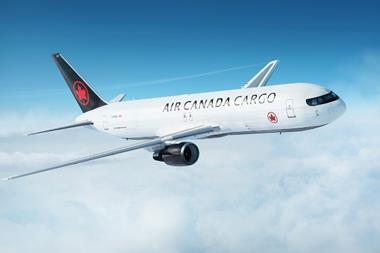Air Canada has again reduced its freighter fleet plans as the transatlantic market comes under pressure.
The Montreal-headquartered airline yesterday revealed in its second-quarter results that it had removed two Boeing 767 freighters from its fleet of eight of the model in April.
The move comes as the carrier has been slimming down its plans to add freighters over recent months.
The carrier had originally planned to operate a fleet of 12 freighters - 10 767s and two Boeing 777s - but in September 2023 announced the cancellation of an order for two newbuild 777Fs.
Then in May this year, Air Canada revealed it had also cancelled plans to convert two 767s into freighters.
The carrier has not been providing explanations for the cancellations, but the transatlantic - the airline's largest cargo market - has been coming under pressure over the last 18 months as passenger airlines have added capacity back onto the trade and demand has been lacklustre.
The latest figures from TAC Index show that average airfreight rates from Frankfurt to North America have fallen rapidly from their pandemic highs.
In July, rates stood at $1.92 per kg which is down 10% on last year and even lags behind the $2.11 per kg carriers were able to achieve in July 2019 - itself a weak year for the air cargo industry.
Meanwhile, during the second quarter, the carrier saw its cargo revenues increase 1% year on year to $230m. For the half year, the carrier's cargo revenues are down 4%.

Second-quarter cargo revenues generated on the Atlantic were down 18.6% year on year, Pacific was up 32.8%, Canada was flat on a year ago, US transborder was up 19.5% and 'other' was up 7.5%.
"The increase was primarily due to higher volume of chargeable kilos of cargo in passenger aircraft in most markets and higher freighter revenues in the Americas," the carrier said.
"The increase was partially offset by lower yield per kilo in most markets and by lower freighter operations in the Atlantic market year over year."
















